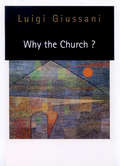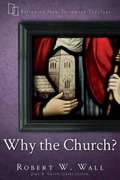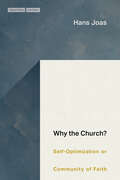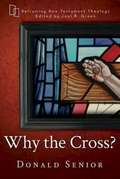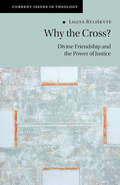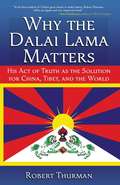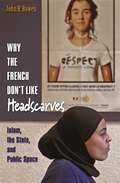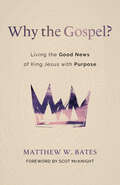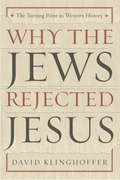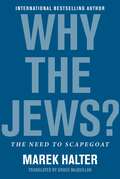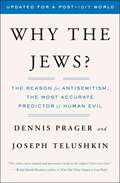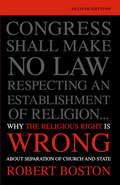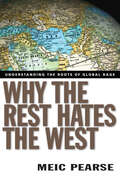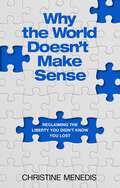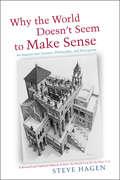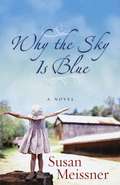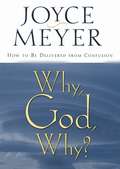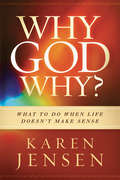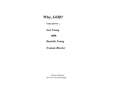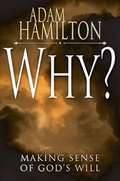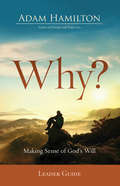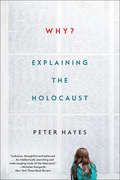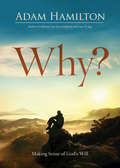- Table View
- List View
Why the Church?
by Luigi GiussaniGiussani begins by focusing on the Church as a community composed of people who are aware of themselves as defined by the gift of the Spirit, from which they derive a new conception of existence, the fruit of conversion. He then describes the Church's developing self-awareness of its dual elements of the human and divine. Concerned with verifying the Church's claim to embody Christ, Giussani situates the locus of verification in human experience, arguing that a different type of life is born in those who try to live the life of the Church. Why the Church? is a seminal study that will engage both the scholar and the general reader.
Why the Church?
by Luigi GiussaniGiussani begins by focusing on the Church as a community composed of people who are aware of themselves as defined by the gift of the Spirit, from which they derive a new conception of existence, the fruit of conversion. He then describes the Church's developing self-awareness of its dual elements of the human and divine. Concerned with verifying the Church's claim to embody Christ, Giussani situates the locus of verification in human experience, arguing that a different type of life is born in those who try to live the life of the Church. Why the Church? is a seminal study that will engage both the scholar and the general reader.
Why the Church? (Reframing New Testament Theology)
by Robert W. WallGiven the way many in the West have read the New Testament in the last century, the church might be regarded as an afterthought at best. But at the worst, it can be viewed as an unnecessary, perhaps even problematic, institutionalization of genuine faith especially in our post-denominational context. These perspectives fly in the face of the robust ecclesiological concerns and commitments of the New Testament documents when read as witnesses from, to, and for congregations of God’s people.For Wall, the problem is spiritual because fewer go to find God in church. Why the church? Because this peculiar fellowship of saints, whose loving communion is with the risen One, has been appointed by the triune God as God's herald. With its sacred vocation, every demonstration of the church’s oneness, holiness, catholicity, and apostolicity—each eschatological mark enabled and brought to maturity by God’s grace—is the concrete means to address our theological crisis. This book will contribute to New Testament studies but also serve related discussions in theology and church history. Reframing New Testament Theology is a series that fulfills the need for brief, substantive, yet highly accessible introductions to central questions and themes raised by New Testament study.
Why the Church?: Self-Optimization or Community of Faith (Cultural Memory in the Present)
by Hans JoasWhy did Christianity produce the special organizational form "church" in the first place? Is it possible to be a Christian without the church? To what extent is Christian faith in community with other believers an alternative to the mere self-optimization of individuals? In this accessible and questioning new work, Hans Joas traverses theological, church-historical, sociological, and ethical territory in search of a viable conception of the church adequate to contemporary globalized societies. Across eleven essays that draw on work by Ernst Troeltsch, Max Weber, Emile Durkheim, H. Richard Niebuhr, Leszek Kolakowski and others, Joas reflects on key debates—from the failure of so-called secularization theory to explain religiosity in modern society, to the role of Christianity and the church in relation to rampant nationalism and refugee crises, and to the question of whether or not human dignity ever was, or still is, the highest value in the West. Addressing the sociology of the church as the distinctive communal formation of Christianity for the last two millennia, Joas underscores the need for Christian conceptions of church to balance theological sensibility with concrete sociological grounding. In the process, he considers the relation of a community of faith to contemporary ideas about the optimization of life.
Why the Cross? (Reframing New Testament Theology)
by Joel B. Green Donald SeniorThe meaning of Jesus's execution on a Roman cross is one of the most divisive issues in contemporary theological discourse because issues related to the goodness of God and the place of suffering in the Christian life are at stake. Although it is important to locate that discussion in the context of the range of New Testament perspectives on the soteriological significance of the cross, it is also important that we recover the meaning of the cross as a metaphor for discipleship. In the end, the event of Jesus's death cannot be understood apart from the character of his life. This book will contribute to New Testament studies but also serve related discussions in theology and Christian formation. Reframing New Testament Theology is a series that fulfills the need for brief, substantive, yet highly accessible introductions to central questions and themes raised by study of the New Testament. A significant defining question will serve as the point of departure and will frame the discussion. Students will be drawn into an active, theological engagement with the New Testament and related materials by the subsequent analysis.
Why the Cross?: Divine Friendship and the Power of Justice (Current Issues in Theology)
by Ligita RyliškytėIn this book, Ligita Ryliskyte addresses what is arguably the most important and profound question in systematic theology: What does it mean for humankind to be saved by the cross? Offering a constructive account of the atonement that avoids pitting God's saving love against divine justice, she provides a biblically-grounded and philosophically disciplined theology of the cross that responds to the exigencies of postmodern secular culture. Ryliskyte draws on Bernard J. F. Lonergan's development of the Augustinian-Thomist tradition to argue that the justice of the cross concerns the orderly communication and diffusion of divine friendship. It becomes efficacious in the dynamic order of the emergent universe through the transformation of evil into good out of love. Showing how inherited theological traditions can be transposed in new contexts, Ryliskyte's book reveals a Christology of fundamental significance for contemporary systematic theology, as well as the fields of theological ethics and Christian spirituality.
Why the Dalai Lama Matters
by Robert ThurmanThe suppression of Tibet's cultural heritage has the potential to set a precedent for all oppressed peoples of the world. Perched on the top of the world, changes in Tibet's ecosystem affect the entire global climate. And, most importantly, Tibet is the spiritual and physical home of His Holiness the Dalai Lama, though he can never return. But why should Tibet matter to you? Tibet is more than its mountains, its monks, and its martyrs. Robert Thurman, renowned Tibetan scholar, teacher, and activist, presents his provocative, five-point plan that will enable China to win the respect of the entire world by allowing Tibet to regain its cultural, economic, and political autonomy. Thurman shows how the Dalai Lama's tireless work is the harbinger of peace for the world and essential for human survival. The book outlines several key factors that will educate and empower readers to take action: What is the history of Tibet, and how do the political, religious, ecological, and social factors affect each other?- Who is the Dalai Lama, and why does his work matter to the world? What does the China-Tibet relationship mean to the global community? What can individuals do to bring attention to this issue, and make a change where they are? How can the five-point plan be used as a model of peaceful change throughout the world?
Why the French Don't Like Headscarves: Islam, the State, and Public Space
by John R. BowenThe French government's 2004 decision to ban Islamic headscarves and other religious signs from public schools puzzled many observers, both because it seemed to infringe needlessly on religious freedom, and because it was hailed by many in France as an answer to a surprisingly wide range of social ills, from violence against females in poor suburbs to anti-Semitism. Why the French Don't Like Headscarves explains why headscarves on schoolgirls caused such a furor, and why the furor yielded this law. Making sense of the dramatic debate from his perspective as an American anthropologist in France at the time, John Bowen writes about everyday life and public events while also presenting interviews with officials and intellectuals, and analyzing French television programs and other media. Bowen argues that the focus on headscarves came from a century-old sensitivity to the public presence of religion in schools, feared links between public expressions of Islamic identity and radical Islam, and a media-driven frenzy that built support for a headscarf ban during 2003-2004. Although the defense of laïcité (secularity) was cited as the law's major justification, politicians, intellectuals, and the media linked the scarves to more concrete social anxieties--about "communalism," political Islam, and violence toward women. Written in engaging, jargon-free prose, Why the French Don't Like Headscarves is the first comprehensive and objective analysis of this subject, in any language, and it speaks to tensions between assimilation and diversity that extend well beyond France's borders.
Why the Gospel?: Living the Good News of King Jesus with Purpose
by Matthew W. BatesWe know what the gospel is—but do we know why it is? As Christians, we often ask what the gospel is, when we should be asking why it is. Matthew W. Bates has previously demonstrated that the &“good news&” of the gospel is that Jesus is King. But in his latest book, he explores God&’s intentions: why has God issued this royal proclamation? And what role can it play in our everyday lives? As Bates observes, we find the answer in a simple but challenging realization: &“I am a horrible king of my own life.&” With examples from Scripture, literature, and personal experience, Bates explains what pledging allegiance to Jesus as ruler of our lives looks like. Living authentically according to God&’s reign conforms humanity to the image of Jesus and extends his glory and honor to all creation. Perfect for church studies, evangelism, or personal spiritual reading, Why the Gospel? invites readers to consider how we can transform our lives and communities through loyalty and devotion to King Jesus. The book includes questions to guide discussion.
Why the Jews Rejected Jesus
by David KlinghofferWhy did the Jews reject Jesus? Was he really the son of God? Were the Jews culpable in his death? These ancient questions have been debated for almost two thousand years, most recently with the release of Mel Gibson's explosive The Passion of the Christ. The controversy was never merely academic. The legal status and security of Jews--often their very lives--depended on the answer. In WHY THE JEWS REJECTED JESUS, David Klinghoffer reveals that the Jews since ancient times accepted not only the historical existence of Jesus but the role of certain Jews in bringing about his crucifixion and death. But he also argues that they had every reason to be skeptical of claims for his divinity. For one thing, Palestine under Roman occupation had numerous charismatic would-be messiahs, so Jesus would not have been unique, nor was his following the largest of its kind. For another, the biblical prophecies about the coming of the Messiah were never fulfilled by Jesus, including an ingathering of exiles, the rise of a Davidic king who would defeat Israel's enemies, the building of a new Temple, and recognition of God by the gentiles. Above all, the Jews understood their biblically commanded way of life, from which Jesus's followers sought to "free" them, as precious, immutable, and eternal.Jews have long been blamed for Jesus's death and stigmatized for rejecting him. But Jesus lived and died a relatively obscure figure at the margins of Jewish society. Indeed, it is difficult to argue that "the Jews" of his day rejected Jesus at all, since most Jews had never heard of him. The figure they really rejected, often violently, was Paul, who convinced the Jerusalem church led by Jesus's brother to jettison the observance of Jewish law. Paul thus founded a new religion. If not for him, Christianity would likely have remained a Jewish movement, and the course of history itself would have been changed. Had the Jews accepted Jesus, Klinghoffer speculates, Christianity would not have conquered Europe, and there would be no Western civilization as we know it. WHY THE JEWS REJECTED JESUS tells the story of this long, acrimonious, and occasionally deadly debate between Christians and Jews. It is thoroughly engaging, lucidly written, and in many ways highly original. Though written from a Jewish point of view, it is also profoundly respectful of Christian sensibilities. Coming at a time when Christians and Jews are in some ways moving closer than ever before, this thoughtful and provocative book represents a genuine effort to heal the ancient rift between these two great faith traditions.
Why the Jews?: The Need to Scapegoat
by Marek Halter** The latest provocative book by the international bestselling author, Marek Halter ** Seventy-five years after the Holocaust, which decimated a people several thousand years old, after we swore in an almost unanimous voice, "Never again," the scourge of anti-Jewish sentiment invades our sidewalks again, especially in Western Europe, including France, the homeland of human rights. Marek Halter, a Jew himself, asks, "Why always the Jews?" This hard-hitting essay examines all the false trials of Jews—religious or otherwise—during troubled periods throughout the world's history.
Why the Jews?: The Reason for Antisemitism
by Joseph Telushkin Dennis PragerFrom the bestselling authors of The Nine Questions People Ask About Judaism comes a completely revised and updated edition of a modern classic that reflects the dangerous rise in antisemitism during the twenty-first century. The very word Jew continues to arouse passions as does no other religious, national, or political name. Why have Jews been the object of the most enduring and universal hatred in history? Why did Hitler consider murdering Jews more important than winning World War II? Why has the United Nations devoted more time to tiny Israel than to any other nation on earth? In this seminal study, Dennis Prager and Joseph Telushkin attempt to uncover and understand the roots of antisemitism -- from the ancient world to the Holocaust to the current crisis in the Middle East. This postmillennial edition of Why the Jews? offers new insights and unparalleled perspectives on some of the most recent, pressing developments in the contemporary world, including: The replicating of Nazi antisemitism in the Arab world The pervasive anti-Zionism/antisemitism on university campuses The rise of antisemitism in Europe Why the United States and Israel are linked in the minds of antisemites Clear, persuasive, and thought provoking, Why the Jews? is must reading for anyone who seeks to understand the unique role of the Jews in human history.
Why the Religious Right Is Wrong About Separation of Church and State
by Robert BostonAward-winning journalist Robert Boston lambastes the zealots of the Religious Right for spreading misinformation about the constitutional principle of the separation of church and state. Boston reveals how a band of ultraconservative religious groups with a political agenda - led primarily by televangelist Pat Robertson - is conducting a systematic war aginst the separation of church and state. The tactics of these groups are designed to exploit unfounded fears and turn the American people against the separationist principle. They will not rest, Boston says, until the United States has become a theocracy.To expose the Religious Right's blatant distortions of U.S. history and correct its skewed analysis of legal rulings, Boston objectively reviews the evolution of church/state relations in the United States and looks at how the separation principle has been applied by the courts. He also examines efforts by sectarian groups to win government support for their schools, the school prayer issue, the history of the free exercise of religion, and the controversial role of religion in the public square.Published in cooperation with Americans United for the Separation of Church and State
Why the Rest Hates the West: Understanding the Roots of Global Rage
by Meic Pearse"Why do they hate us so much?" Many in the U.S. are baffled at the hatred and anti-Western sentiment they see on the international news. Why are people around the world so resentful of Western cultural values and ideals? Historian Meic Pearse unpacks the deep divides between the West and the rest of the world. He shows how many of the underlying assumptions of Western civilization directly oppose and contradict the cultural and religious values of significant people groups. Those in the Third World, Pearse says, "have the sensation that everything they hold dear and sacred is being rolled over by an economic and cultural juggernaut that doesn?t even know it?s doing it . . . and wouldn?t understand why what it?s destroying is important or of value." Pearse's keen analysis offers insight into perspectives not often understood in the West, and provides a starting point for intercultural dialogue and rapprochement.
Why the World Doesn't Make Sense: Reclaiming the Liberty You Didn't Know You Lost
by Christine MenedisWhy the World Doesn&’t Make Sense: Reclaiming the Liberty You Didn&’t Know You Lost by Christine Menedis is a provocative call to action, challenging readers to confront the forces shaping our future and reclaim their freedom and independence in a rapidly changing world.Why the World Doesn&’t Make Sense is a compelling exploration of the hidden forces undermining personal freedom and sovereignty in today&’s world. Christine Menedis, an early bitcoiner and veteran entrepreneur, reveals how ordinary citizens are unknowingly surrendering control over their lives to an intricate web of government systems, financial institutions, and global organizations. In a world that increasingly values conformity over independence, Menedis challenges readers to question the status quo and regain the liberty they may not even realize has slipped away. With deep historical insights and thoughtful guidance, Menedis examines how global powers wield influence through money, digital tools, and media narratives. She explores the subtle yet powerful forces that shape our economic and political systems, drawing connections between the rise of centralized control and the erosion of strong individuals. She breaks down complex issues in an accessible way, from the evolution of money to the steady creep of surveillance, giving readers the tools to understand and resist these trends. Grounded in both philosophy and modern-day realities, Why the World Doesn&’t Make Sense is both a wake-up call and a road map for readers who feel disoriented in a world of contradictions. Menedis&’s call to action empowers readers to reclaim their independence, challenge centralized power, and defend their own sense of liberty in an era of unprecedented global influence.
Why the World Doesn't Seem to Make Sense: An Inquiry into Science, Philosophy, and Perception
by Steve HagenThe bestselling author of Buddhism Plain and Simple ponders what we truly know about reality. Why the World Doesn&’t Seem to Make Sense is an eminently down-to-earth, practical, and non-technical response to the urgent questions posed by contemporary science and philosophy. This revised and updated edition of How the World Can Be the Way It Is includes new scientific understanding and clarification of some of its more complex ideas. Steve Hagen aims for an intelligent general audience not necessarily familiar with modern or classical physics, philosophy, or formal logic. Hagen takes us on a journey that examines our most basic assumptions about reality and carefully addresses the &“paradoxes of the one and the many&” that other works only identify. His primary purpose is to help us to perceive the world directly—as it is, not how we conceive it to be. Through this perception each of us can answer profound moral questions, resolve philosophical and ethical dilemmas, and live lives of harmony and joy. Praise for Why the World Doesn&’t Seem to Make Sense &“For those who are certain that objectivity and intellect are the ground floor of all knowledge, this can be a valuable tripe to the sub-basement.&” —Robert Pirsig, author of Zen and the Art of Motorcycle Maintenance &“An unusually stimulating and exhilarating book, of profound value to those seeking to clarify the essential nature of everyday existence—in short, all of us.&” —Peter Matthiessen, author of The Snow Leopard &“Read this book: it will change how you look at things.&” —Nick Herbert, PhD, author of Quantum Reality &“Hagen cuts cleanly through the duality of mind and body, perception and conception, science and religion, and takes us on a spell-binding journey through what we know—and what we only think we know—that ultimately provides a fresh, effective, and remarkably simple grounding for our lives. . . . Original, breathtaking, and beautiful.&” —Natalie Goldberg, author of Writing Down the Bones
Why the sky is blue
by Susan MeissnerClaire and Dan are happy parents of two, until the night Claire is attacked---and becomes pregnant. While she's struggling to trust God "in all things," Dan confesses his unwillingness to be a father to this baby. They agree to pursue adoption, but what happens 16 years later . . . when the relinquished child returns? 325 pages, softcover from Harvest.
Why, God, Why? How to Be Delivered from Confusion: How to Be Delivered from Confusion
by Joyce MeyerA guide to letting go of the question "Why?" and trust in God's plan for you.
Why, God, Why?: What to Do When Life Doesn't Make Sense
by Karen Jensen“Why do bad things happen?” “God, I don’t understand!” Heartbreak and loss happen to us all. On New Year’s Day, at the age of thirty-seven, Karen Jensen’s husband died suddenly in his bed, leaving her alone to raise two grieving boys and pastor a bewildered congregation. Despite her strong faith and love for God, she had some serious questions. Has tragedy shaken the foundation of your life? Have you been blindsided by an event you never expected to face? What should we do when we’re going through the dark places in life? …when we’ve lost everything? …when we’re in pain? …when we’re wondering why? With a mix of sharp insight and warm optimism, Karen skillfully combines experience and scripture to guide you through the land mines of doubt and confusion that come with loss. She then provides solid principles for moving forward past the pain and into a brighter future.
Why, God? Come and See
by Joel Young Danielle Young Truman BlockerWhy, God? Come and See ... answers difficult questions in a captivating and enlightening manner. These answers make it easier to trust GOD and to love HIM, when you see HIM for WHO HE truly IS. Unique to our book is the fact that most of the questions are answered from three perspectives, the serious Bible student or scholar, the growing Christian or enquiring mind, and the gut-level man-on-the-street.
Why?
by Adam HamiltonWhen the ground shakes, and a poor nation's economy is destroyed; when the waters rise, washing away a community's hopes and dreams; when a child suffers neglect and abuse; when violence tears apart nations; where is God? If God is all powerful, and if each one of us is a beloved child of God, then how can God allow tragedy and suffering to infest his creation? When we lift our prayers to God, and no answer seems to come; when we earnestly seek to know the will of God for our lives, yet can't seem to discern it; when God seems far away; where is God? If God counts the hairs on our head, and knows every sparrow that falls, why is finding and understanding God's will so difficult at times?In Why? Making Sense of God's Will best-selling author Adam Hamilton brings fresh insight to the age-old question of how to understand the will of God. Rejecting simplistic answers and unexamined assumptions, Hamilton addresses how we can comprehend God's plan for the world and ourselves. "When it comes to the weightiest problems for our faith, like suffering and unanswered prayers and God's will, philosophers don't get the job done for me. But thoughtful pastors do. For me, the one thoughtful pastor who offers wisdom for our deepest questions is Adam Hamilton. This book is a rare gift and the kind of book that needs to be close at hand for all Christians. This book proves theology has to be done by pastors."-Scot McKnight, author of A Community Called Atonement "As someone for whom the 'Christian answers' I grew up with failed to satisfy the troubling questions of my adulthood, I deeply appreciate Adam Hamilton's thoughtful book Why? I recommend this book to anyone who longs to leave behind simplistic answers and discover a God who invites them into a collaborative process of bringing redemption, love and hope to a world in desperate need."-Lynne Hybels, author of Nice Girls Don't Change the World "Unlike many Christian writers these days, Adam Hamilton does actually make sense of God's will. This is a profoundly satisfying treatment of common misconceptions about God. Everyone who asks 'Why?' when confronted with evil, innocent suffering, unanswered prayers, and failure to perceive God's will should read this book."-Roger Olson, author of Questions to All Your Answers
Why? Leader Guide: Making Sense of God's Will (Why?)
by Adam HamiltonWhere is God when tragedy and suffering strike?When the ground shakes, and a poor nation's economy is destroyed; when the waters rise, washing away a community's hopes and dreams; when a child suffers neglect and abuse; when violence tears apart nations; where is God; If God is all powerful, and if each one of us is a beloved child of God, then how can God allow tragedy and suffering to infest his creation?In Why?, best-selling author Adam Hamilton brings fresh insight to the age-old question of how to understand the will of God. Rejecting simplistic answers and unexamined assumptions, he lays out core ideas for comprehending God's plan for the world, including: God will not take away our free will, even when we use it to grieve him.God will never abandon us, especially in the midst of our suffering.While God is not the author of suffering, God will bring blessing out of tragedy.
Why? Trusting God When You Don't Understand
by Anne Graham LotzUsing the story of Mary, Martha, and Lazarus from Jon 11, Mrs. Lotz gives us reasons to trust God when nothing else makes sense.
Why?: Explaining the Holocaust
by Peter HayesFeatured in the PBS documentary, "The US and the Holocaust" by Ken Burns, Lynn Novick and Sarah Botstein "Superbly written and researched, synthesizing the classics while digging deep into a vast repository of primary sources." —Josef Joffe, Wall Street Journal Why? explores one of the most tragic events in human history by addressing eight of the most commonly asked questions about the Holocaust: Why the Jews? Why the Germans? Why murder? Why this swift and sweeping? Why didn’t more Jews fight back more often? Why did survival rates diverge? Why such limited help from outside? What legacies, what lessons? An internationally acclaimed scholar, Peter Hayes brings a wealth of research and experience to bear on conventional views of the Holocaust, dispelling many misconceptions and challenging some of the most prominent recent interpretations.
Why?: Making Sense of God's Will (Why?)
by Adam HamiltonWhere is God when tragedy and suffering strike?When the ground shakes, and a poor nation's economy is destroyed; when the waters rise, washing away a community's hopes and dreams; when a child suffers neglect and abuse; when violence tears apart nations; where is God; If God is all powerful, and if each one of us is a beloved child of God, then how can God allow tragedy and suffering to infest his creation?In Why?, best-selling author Adam Hamilton brings fresh insight to the age-old question of how to understand the will of God. Rejecting simplistic answers and unexamined assumptions, he lays out core ideas for comprehending God's plan for the world, including: God will not take away our free will, even when we use it to grieve him.God will never abandon us, especially in the midst of our suffering.While God is not the author of suffering, God will bring blessing out of tragedy.
